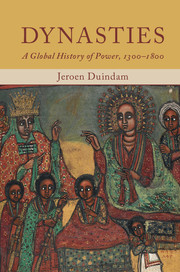Book contents
Introduction
Published online by Cambridge University Press: 05 October 2015
Summary
One cannot imagine a dynasty without civilization, while a civilization without dynasty and royal authority is impossible, because human beings must by nature co-operate, and that calls for a restraining influence. Political leadership, based either on religious or royal authority, is obligatory … This is what is meant by dynasty.
Ibn Khaldun, The Muqaddimah, ed. Franz Rosenthal, Book IV, chap. 20, 291.Kinship to kingship?
Dynasty plays a marginal role in today's world. Most modern political systems define themselves as the antithesis of ancien régime monarchy, with election as the prime method of succession to high office and a strong bias against family-based networks of power. Royalty retains a surprising potential to attract crowds and generate veneration, but it is mostly seen as the relic of an earlier and darker age. Such reservations about kingship have a long history. Hippocrates (460–377 BCE) observed that ‘where there are kings, there must be the greatest cowards. For [here] men's souls are enslaved, and refuse to run risks readily and recklessly to increase the power of somebody else.’ This connection between kingship and servitude has been noted many times since. The Englishman J. Alfred Skertchly, visiting the West African kingdom of Dahomey in the early 1870s, enjoyed the remarkable honour of being proclaimed a prince by the reigning king Glele (?–1858–1889). Nevertheless, he ridiculed the obligatory ritual greeting performed by all who approached the king:
The … salutation consists of a prostration before the monarch with the forehead touching the sand, and afterwards rubbing the cheeks on the earth, leaving a red patch of sand on either side … Then follows the dirt bath … a series of shovelling of the earth over the head … when receiving or asking any particular favour, the saluter completely smothers himself with the red earth; rubbing it well into the arms and neck until it sticks to the perspiring skin like dough.
The extreme elevation of one person over others does not conform to modern sensibilities. In 1786, one of Europe's leading monarchs, Habsburg emperor Joseph II (1741–1780–1790), abolished the reverence on bended knee at the Austrian court, arguing that this show of respect ‘is unnecessary between humans, and should be reserved for God alone’.
- Type
- Chapter
- Information
- DynastiesA Global History of Power, 1300–1800, pp. 1 - 20Publisher: Cambridge University PressPrint publication year: 2015



